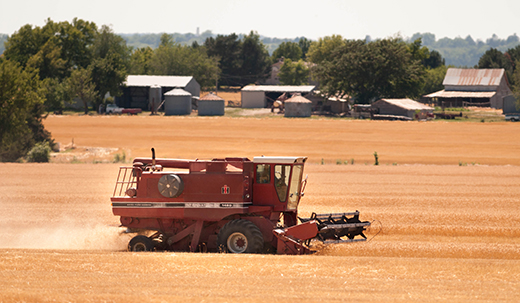Kansas State University-led team awarded $4 million NSF grant to accelerate crop breeding
Thursday, Aug. 30, 2018

A Kansas State University-led research team has received a $4 million dollar grant from the NSF Focused EPSCoR Collaborations program to develop ways to improve crop yields, crop breeding programs and in-field management.
MANHATTAN — Boosting crop yields to feed a growing world population expected to double by 2050 is the aim of newly funded multidisciplinary research led by Kansas State University.
Stephen Welch, professor of agronomy at Kansas State University, along with co-investigators Phillip Alderman, assistant professor of agronomy at Oklahoma State University, and Franklin Fondjo Fotou, assistant professor and chair of the department of technology at Langston University, have been awarded a four-year, $4 million grant from the National Science Foundation. Their goal is to develop ways to improve crop yields, crop breeding programs and in-field management. They will lead a team that draws on expertise from many disciplines.
"We have to accelerate our rate of breeding improvement," Welch said. "There are many lines of attack on this problem, and what we are looking at is how to fit those approaches together so they can be used in concert with each other."
The grant comes from the NSF Focused EPSCoR Collaborations program and is designed to promote nationwide scientific progress and build capacity. The program requires projects to include researchers from at least two eligible jurisdictions with an integrated vision.
The project, "Building Field-based Ecophysiological Genome-to-Phenome Prediction," will use wheat as an example crop. Wheat accounts for 20 percent of the world's calories and nourishment. The team will build a new computer model for wheat that combines crop physiology and genetics plus state-of-the-art field monitoring technologies. Instead of inferring soil profile data, canopy temperatures, development phases and so on, the model will use actual measurements enabled by new technology to predict how different wheat varieties will perform in different environments.
Integrating knowledge is the team's priority goal. By synergizing the best current features from multiple approaches, Welch and his team are looking to build a new model and supporting data system from scratch.
"We want to redesign the way we are approaching modeling and analysis," Alderman said. "The goal isn't to cobble together things off the shelf, but to take a step back and say, 'If we know we are going to have these data coming from the field from robots and unmanned aerial vehicles, let's build models that take that in as part of driving the model.'"
Training students is another crucial aspect of building capacity to ensure future food security.
"We are learning about plant growth and how we can control it and predict production, but we are also bringing in students who can gain experience and learn from that opportunity," Fondjo Fotou said. "It may give them a job tomorrow."
Students will learn how to work across disciplines and institutions as well as with the private sector. Alderman said he is excited to learn more about high-performance computing from Fondjo Fotou, who will also team with Kansas State University on robotics.
Technology and changing attitudes are making projects like this one possible, Welch said, citing advances in genetics, such as understanding how genes control when a plant flowers in different environments. Fondjo Fotou noted that machine learning and artificial intelligence offer tools that push researchers in new directions. Alderman said on a human level, the scientific community recognizes that reaching outside single disciplines is necessary to solve complex problems.
Industry partners cooperating in the project include IBM Research, DuPont Pioneer, Topcon Agriculture, DJI and Veris Technologies.
Beth Montelone, senior associate vice president for research at Kansas State University, said Welch's efforts to bring soil chemists, geneticists, statisticians, engineers, breeders, computer scientists, crop management and other experts together is an impressive undertaking.
"This project is an exemplar of the sort of multidisciplinary research efforts that funding agencies such as the NSF are really fostering," Montelone said.
The researchers said their project will result in better real-world recommendations for producers and a multiplier effect for future research efforts.
"What excites me is the opportunity to do something about the critical food security problem, and more than that, to bring along students and improve research capacity so as we move through the next 30 years, our ability to progress increases and increases," Welch said. "That's the positive multiplier that is giving us a unique opportunity to punch out a big one."
